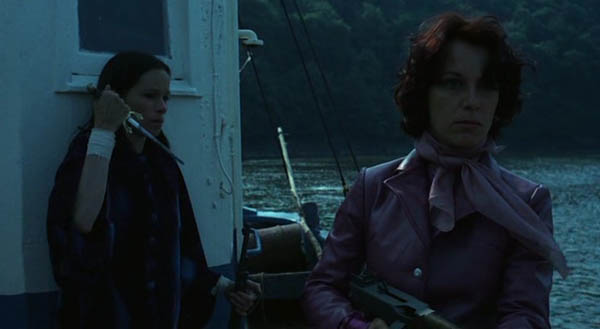Written for Cineaste (Winter 2018). — J.R.

Auteur Theory and My Son John
by James Morrison. New York: Bloomsbury Academic, 2018.
190 pp. Hardcover: $75.00, Paperback: $19.95, and Ebook:
$17.95.
My admiration for and my demurrals about James Morrison’s brilliant monograph both begin on the first pages of his Introduction. He quotes the title subject of Mike Nichols: An American Master (2016) on the “froggy conspiracy” which elevates figures like Howard Hawks and Jerry Lewis at the expense of George Stevens, Billy Wilder, William Wyler, and Fred Zinnemann (“our greatest directors”), a statement that Morrison aptly compares to the vulgar parodies of existential beatniks in Stanley Donen’s Funny Face. Yet two pages later, when he calls Nichols “countable as one of the ‘auteurs’ who by common consent ushered in the New Hollywood,” Morrison seems to be indulging in aspects of the same parody, especially when one considers that he’s decided to suppress the information that Mike Nichols: An American Master is the work of a genuine auteur, Elaine May (coincidentally, Donen’s current partner), and not only because, unlike Nichols, she functions as a film writer as well as a film director. I presume that Morrison chose to suppress May’s involvement in this glib claptrap because it complicates his argument, especially when he goes on to show that Nichols’ tirade is seemingly bolstered by May’s montage of dumb quotes from Bosley Crowther about Bonnie and Clyde, and from Pauline Kael and Renata Adler about 2001, constituting what Morrison rightly calls “a slam against film criticism as such”. Read more
Edward Yang’s most accessible movie (2000) follows three generations of a contemporary Taipei family from a wedding to a funeral, and while it takes almost three hours to unfold, not a moment seems gratuitous. Working with nonprofessional actors, Yang coaxes a standout performance from Wu Nien-jen as N.J., a middle-aged partner in a failing computer company who hopes to team up with a Japanese game designer and who has a secret rendezvous in Tokyo with a girl he jilted 30 years earlier; other major characters include the hero’s eight-year-old son, teenage daughter, spiritually traumatized wife, comatose mother-in-law, and debt-ridden brother-in-law. The son, who becomes obsessed with photographing what people can’t see, may come closest to being a mouthpiece for Yang, who seems to miss nothing as he interweaves shifting viewpoints and poignant emotional refrains, creating one of the richest families in modern movies. In Mandarin with subtitles. 173 min. (JR) Read more

The strangest by far of Jacques Rivette’s films (1976), and perhaps the last gasp of the modernist strain that infused his work from L’amour fou to Out 1 to Celine and Julie Go Boating, this is a violent and unsettling fusion of a female pirate adventure (filmed on some of the same locations used for The Vikings and inspired in part by Lang’s Moonfleet, but set in no particular place or period), mythological fantasy, Jacobean tragedy (with many lines borrowed from Tourneur’s Revenger’s Tragedy), experimental dance film (with live improvised music from a talented trio of musicians), and personal psychodrama. The eclectic cast includes Geraldine Chaplin, Bernadette Lafont, Kika Markham (Two English Girls), and a few members of Carolyn Carlson’s dance company. While the mise en scène and locations are often stunning, the film seems contrived to confound conventional emotional reactions of any sort. It’s a movie where the casual slitting of someone’s throat and the swishing sounds of Lafont’s leather pants are made to seem equally relevant — a world apart from Rivette’s more recent La belle noiseuse. Yet Rivette’s feeling for duration, immediacy, and moods of menace are fully present here, and days or weeks after you see this chilling conundrum of a movie, sounds and images may come back to haunt you. Read more

